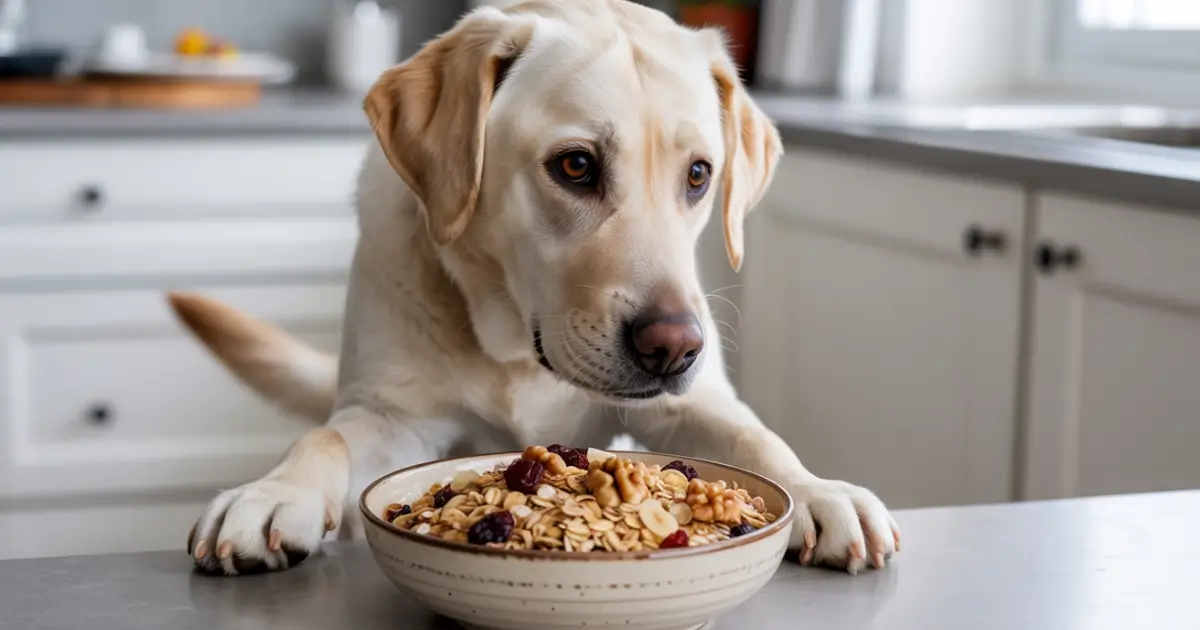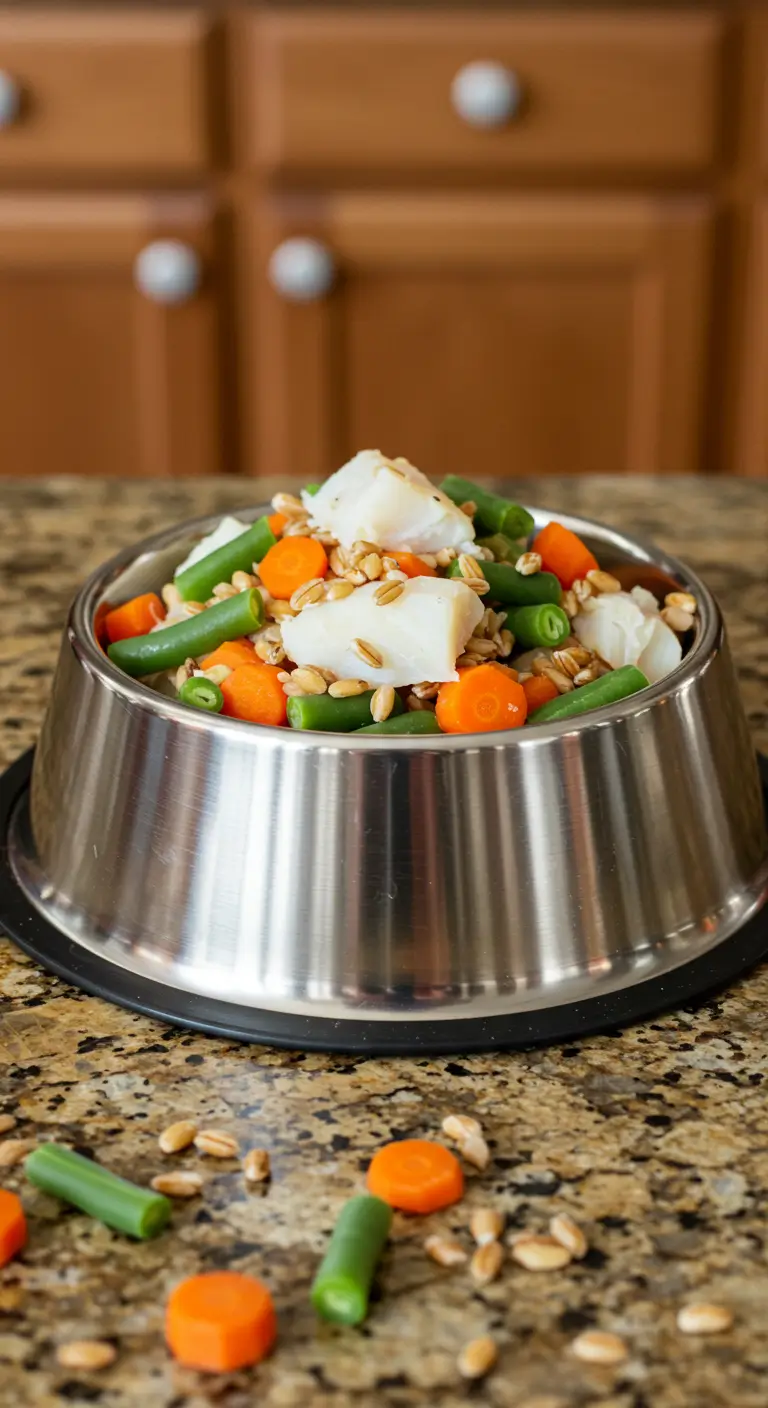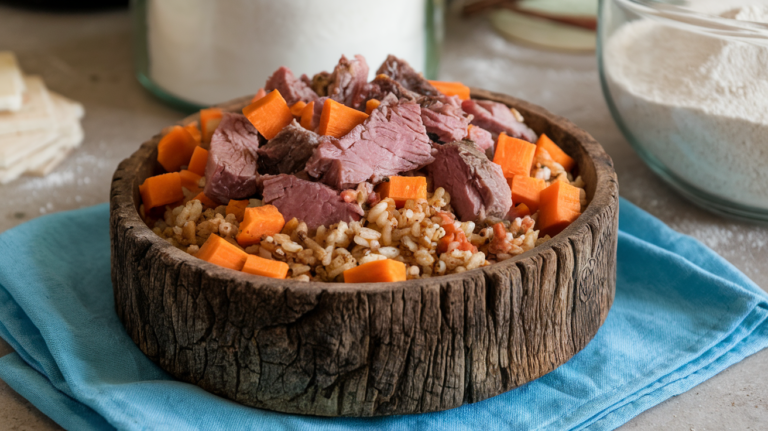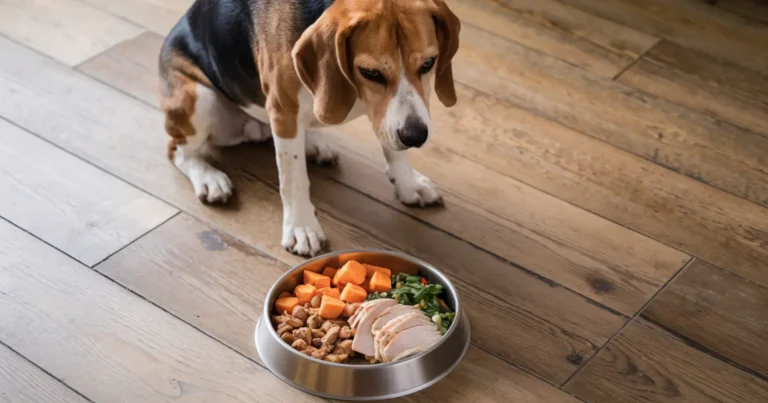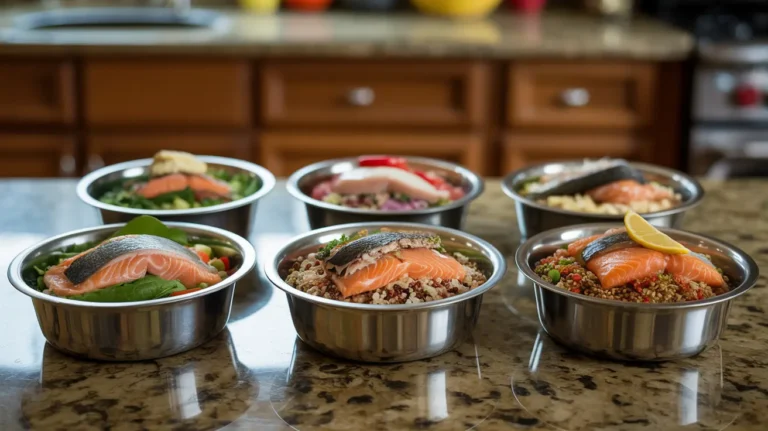Can Dogs Eat Granola? 7 Critical Safety Warnings
As someone who owns a dog, you might have asked yourself, “Can dogs eat granola?” when sharing breakfast time with your canine companion. This seemingly healthy human snack raises important questions about safety and nutrition for our four-legged friends. While granola isn’t immediately toxic to dogs in the way chocolate or grapes are, there are several critical factors to consider before offering this crunchy mixture to your pet.
This comprehensive guide explores whether is granola good for dogs, the potential risks it poses, and provides seven essential safety guidelines every responsible pet owner should understand before sharing this popular breakfast food with their dog.
Table of Contents
Understanding Granola: What’s in This Popular Human Food?
Before determining whether can dogs have granola, it’s important to understand what typical granola contains and how these ingredients might affect canine health.
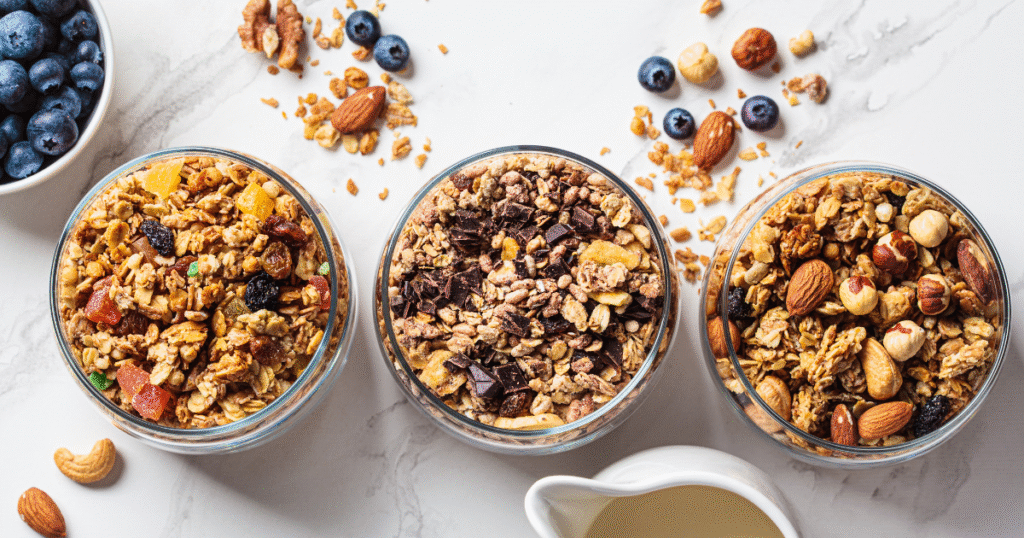
Common Granola Ingredients
Most commercial granola products contain some combination of:
- Rolled oats (the primary base ingredient)
- Nuts (almonds, walnuts, pecans, etc.)
- Seeds (sunflower, pumpkin, flax, etc.)
- Sweeteners (honey, maple syrup, brown sugar, etc.)
- Dried fruits (raisins, cranberries, apricots, etc.)
- Oils (often vegetable, coconut, or canola)
- Spices (cinnamon, nutmeg, etc.)
- Salt
- Sometimes, chocolate chips or candy pieces
- Preservatives and additives
In specialized varieties, you might also find:
- Protein powder or supplements
- Coconut flakes
- Yogurt pieces
- Various grains beyond oats (quinoa, millet, etc.)
The question of can dogs eat granola bars brings additional concerns, as these often contain even more sweeteners, binding agents, and artificial ingredients than loose granola.
The Primary Concerns for Dogs
Several ingredients common in granola raise significant concerns when evaluating is granola bad for dogs:
- Raisins and certain dried fruits: Raisins, currants, and grapes are toxic to dogs and can cause kidney failure even in small amounts.
- Nuts: Several types present issues:
- Macadamia nuts are toxic to dogs
- Almonds and other nuts pose choking and digestive blockage risks
- High fat content in most nuts can trigger pancreatitis
- Some nuts may contain mold toxins harmful to dogs
- Sweeteners: Beyond contributing to weight gain:
- Xylitol, which is found in certain “diet” granolas, is highly toxic to dogs.
- Even natural sweeteners like honey and maple syrup add unnecessary sugar
- High caloric density: Granola is formulated to be high in energy for humans, which can lead to overfeeding in dogs.
Taking these concerns into account, let’s look at seven important safety guidelines to consider when asking, “can dogs eat granola?”
7 Critical Safety Guidelines for Dogs and Granola

When determining whether can dogs have granola, follow these essential guidelines to protect your pet’s health:
1. Check for Toxic Ingredients First
The most important consideration when evaluating is granola bad for dogs is to check for ingredients that are known to be toxic to canines:
- Raisins and grapes: Even small amounts can cause kidney failure in some dogs
- Macadamia nuts: Toxic to dogs and can cause weakness, hyperthermia, and vomiting
- Chocolate: Often found in some granola mixes, chocolate contains theobromine, which is toxic to dogs
- Xylitol: This artificial sweetener is extremely dangerous to dogs, causing rapid insulin release and potentially fatal hypoglycemia
When asking can dogs eat granola bars, be especially vigilant, as many commercial bars contain these problematic ingredients. A single granola product may contain multiple toxic components, making most commercial granolas unsafe for canine consumption.
2. Consider the High Fat Content
Many granola products contain significant fat from:
- Nuts and seeds
- Added oils used in toasting or binding
- Coconut or other high-fat additions
This high fat content is problematic when determining is granola good for dogs because:
- Pancreatitis risk: High-fat foods can trigger inflammation of the pancreas, a painful and potentially serious condition
- Obesity concerns: Fat contains more than double the calories per gram compared to protein or carbohydrates.
- Digestive upset: Many dogs have difficulty properly digesting high-fat foods, leading to diarrhea or vomiting
Dogs with a history of pancreatitis or digestive issues should never be given granola, regardless of the other ingredients it contains.
3. Be Aware of Excess Sugar and Carbohydrates
When considering can dogs eat granola, the sugar content presents significant concerns:
- Weight gain and obesity: Regular consumption of sugary foods contributes to unhealthy weight gain
- Dental Issues: Sugar contributes to tooth decay and gum disease.
- Blood sugar fluctuations: Particularly problematic for dogs with diabetes or insulin sensitivities
- Behavioral impacts: Some dogs may experience hyperactivity or energy crashes after consuming high-sugar foods
Most commercial granolas contain 10-15 grams of sugar per serving—a substantial amount for dogs, especially smaller breeds. Even the oats themselves are high in carbohydrates, which convert to sugar in the body.
4. Be Cautious About Choking and Digestive Hazards
The physical properties of granola create practical concerns when determining can dogs eat granola bars or loose granola:
- Hard, crunchy pieces: May pose choking hazards, especially for small dogs or those who eat rapidly
- Nuts and dried fruits: Can create intestinal blockages if not chewed properly
- Sharp edges: Some toasted granola pieces may have sharp edges that could cause minor oral injuries
These physical characteristics make granola potentially dangerous even beyond its ingredient concerns.
5. Consider Your Dog’s Size and Individual Health
When evaluating is granola good for dogs, your individual dog’s characteristics matter significantly:
- Small dogs: Experience more pronounced effects from even small amounts of problematic ingredients
- Dogs with diabetes: Should never consume granola due to the high carbohydrate and sugar content
- Overweight dogs: Additional calories from energy-dense granola can exacerbate weight issues
- Dogs with dental problems: Hard granola pieces may damage already compromised teeth
- Dogs with food sensitivities: May react adversely to various ingredients found in granola
For most dogs with existing health conditions, the answer to can dogs have granola should be a firm “no” regardless of the specific variety.
6. Understand That Granola Offers Limited Nutritional Benefits
When asking is granola good for dogs, consider that commercial dog foods are already formulated to meet your pet’s nutritional needs. Granola offers:
- Primarily carbohydrates, for which dogs have a limited nutritional requirement
- Some protein, but not in the optimal amino acid profile for dogs
- Vitamins and minerals, but often in forms less bioavailable to dogs than those in quality dog food
- Excessive calories relative to nutritional benefits
Any potential benefits from the whole grains in granola are generally outweighed by the risks and inappropriate nutrient profile for canine dietary needs.
7. Choose Dog-Specific Alternatives Instead
Rather than wondering if can dogs eat granola, consider offering these safer, more nutritious alternatives:
- Commercial dog treats: Specifically formulated for canine nutritional needs
- Plain, cooked oatmeal: In small amounts, without added sugar or flavors
- Fresh vegetables: Carrots, green beans, or cucumber slices provide crunch without sugar
- Limited fruit: Small amounts of blueberries or apple slices (without seeds) offer natural sweetness with fewer concerns
- Plain air-popped popcorn: As covered in our article about can dogs eat popcorn, this can be an occasional, low-calorie treat when prepared properly
These alternatives satisfy your dog’s desire for treats while avoiding the problematic ingredients and characteristics of granola.
Granola Bars: Additional Concerns
The question can dogs eat granola bars deserves special attention, as these processed products often contain additional problematic ingredients:
Binding Agents and Preservatives
Commercial granola bars typically include:
- Binding syrups: Usually high in sugar or artificial sweeteners
- Preservatives: To extend shelf life
- Stabilizers and texturizers: Chemical additives that may cause digestive upset
- Artificial flavors and colors: Potential allergens with no nutritional value
Concentrated Problematic Ingredients
Granola bars often contain concentrated versions of concerning ingredients:
- Higher amounts of sweeteners to improve palatability and binding
- Chocolate chips or yogurt coatings (which may contain xylitol)
- Multiple types of nuts or dried fruits in a dense format
Wrapper Concerns
The packaging itself presents additional hazards:
- Foil or plastic wrappers: May be consumed along with the bar if left accessible
- Individual packaging: Easier for dogs to steal and consume whole
For these reasons, the answer to can dogs eat granola bars is generally an even stronger “no” than for loose granola.
Comparing Granola to Other Human Foods
To better understand the risks of granola, it’s helpful to compare it to other human foods dog owners might consider sharing.

Other Breakfast Foods
When comparing granola to other common breakfast items:
- Plain oatmeal: Unflavored, cooked oatmeal without additives is generally safer than granola for most dogs in small amounts.
- Cereal: Most commercial cereals present similar concerns to granola—high sugar, potential artificial additives, and minimal nutritional benefit for dogs.
- Yogurt: Plain, unsweetened yogurt (without xylitol) can actually be beneficial for some dogs in moderation, unlike most granola products.
Other Human Snacks
Comparing granola to other common human snacks:
- Marshmallows: As detailed in our article about can dogs eat marshmallows, these sweet treats contain sugar but lack the toxic ingredients like raisins or nuts that may be present in granola.
- Jello: Our guide on can dogs eat Jello explains that while commercial Jello products aren’t ideal for dogs, they generally don’t contain the multiple potentially toxic ingredients that granola might.
- Pickles: In our article about can dogs eat pickles, we explore how pickles primarily present concerns about sodium content, rather than the multiple potential toxins in many granola mixes.
- Pretzels: While not ideal due to salt content, plain pretzels typically don’t contain toxic ingredients like raisins or macadamia nuts that might be found in granola.
These comparisons illustrate how granola often presents more complex concerns than many other human foods due to its multiple potentially problematic ingredients combined in one product.
What To Do If Your Dog Eats Granola
If your dog has already consumed granola, the appropriate response depends on what was eaten and how much:
If Your Dog Ate Granola Containing Toxic Ingredients:
- Raisins/grapes: This is an emergency requiring immediate veterinary attention, regardless of amount.
- Macadamia nuts: Seek veterinary care immediately.
- Chocolate pieces: The severity depends on the amount and type of chocolate, but veterinary guidance is recommended.
- Xylitol: This is a serious emergency—call your vet or an animal poison control center immediately.
If Your Dog Ate Granola Without Obviously Toxic Ingredients:
- Small amount: For most healthy adult dogs, a small amount of plain granola without toxic ingredients will likely just cause minor digestive upset. Monitor for vomiting or diarrhea.
- Large amount: Watch for signs of digestive distress, pancreatitis (vomiting, abdominal pain, lethargy), or blockage (straining, inability to defecate, abdominal discomfort). Contact your veterinarian if symptoms develop.
Watch for These Symptoms:
Seek veterinary care if your dog displays:
- Vomiting or diarrhea that persists for more than a few hours
- Lethargy or weakness
- Abdominal pain (hunched posture, whining when the abdomen is touched)
- Signs of blockage (straining without producing stool, lack of appetite)
- Unusual thirst or urination patterns
- Tremors, seizures, or difficulty walking
Key Takeaways: Can Dogs Eat Granola?
To summarize what we’ve learned about whether can dogs eat granola:
- Many granola products contain ingredients toxic to dogs, including raisins, macadamia nuts, chocolate, or xylitol
- High fat content can trigger pancreatitis or contribute to obesity
- Excessive sugar and carbohydrates offer no nutritional benefit while posing health risks
- Physical properties create choking and digestive hazards
- Dogs with health conditions face even greater risks from granola consumption
- Commercial granola bars typically present additional concerns beyond loose granola
- Better alternatives exist that provide treats without the multiple risks of granola
Conclusion: Making Informed Decisions About Granola for Dogs
When evaluating whether is granola good for dogs, the evidence strongly suggests it’s best avoided in most circumstances. While plain oats themselves aren’t toxic to dogs, the combination of potentially dangerous ingredients, high fat and sugar content, and minimal nutritional benefits makes granola a poor choice for canine consumption.
The answer to can dogs have granola is generally “no” for most commercial products. If you’re determined to share something similar with your pet, consider a small amount of plain, cooked oatmeal without any additives as a safer alternative to granola.
Instead of wondering if can dogs eat granola bars or loose granola, focus on providing your dog with treats specifically formulated for their nutritional needs or simple, whole foods that offer actual health benefits without the risks. The best way to show love to your pet is through appropriate nutrition, exercise, and attention, not by sharing potentially problematic human foods.
For more comprehensive information about foods that are safe to share with your dog, check out our main guide on what foods can dogs eat from the table, which covers a wide range of human foods and their safety for canine consumption.
FAQs About Dogs and Granola
Can puppies eat granola?
Puppies should never be given granola. Their developing digestive systems are more sensitive, they’re at higher risk for choking, and they need carefully balanced nutrition for proper growth. Additionally, puppies are smaller, making even tiny amounts of toxic ingredients like raisins potentially more dangerous.
Is homemade granola safer for dogs?
Homemade granola can be marginally safer if you carefully exclude all toxic ingredients (no raisins, grapes, macadamia nuts, chocolate, or xylitol). However, even homemade granola typically contains high amounts of fat and sugar, making it suboptimal for dogs. A better approach would be making simple dog-specific treats instead.
Can dogs eat granola with yogurt?
Plain yogurt itself isn’t harmful to most dogs (unless they’re lactose intolerant), but granola with yogurt coating often contains added sugar and sometimes xylitol. Additionally, the granola component still presents all the concerns discussed throughout this article. Plain, unsweetened yogurt without granola is a better option for dogs who can tolerate dairy.
What if my granola only contains oats and honey?
Even simplified granola with just oats and honey still presents concerns due to:
- The high sugar content from honey
- The concentrated carbohydrates in toasted oats
- The high caloric density
- The crunchy texture may pose choking risks
While less dangerous than granola with toxic ingredients, it still offers minimal nutritional benefit relative to its risks and caloric content.
Are there any types of granola that are safe for dogs?
Rather than searching for a “safe” commercial granola, consider that dogs simply don’t need granola in their diet. Their nutritional requirements are different from humans, and quality dog food already meets those needs. If you want to offer your dog a special treat, there are many better options specifically designed for canine consumption that don’t carry the multiple concerns associated with granola.
Understanding Granola

